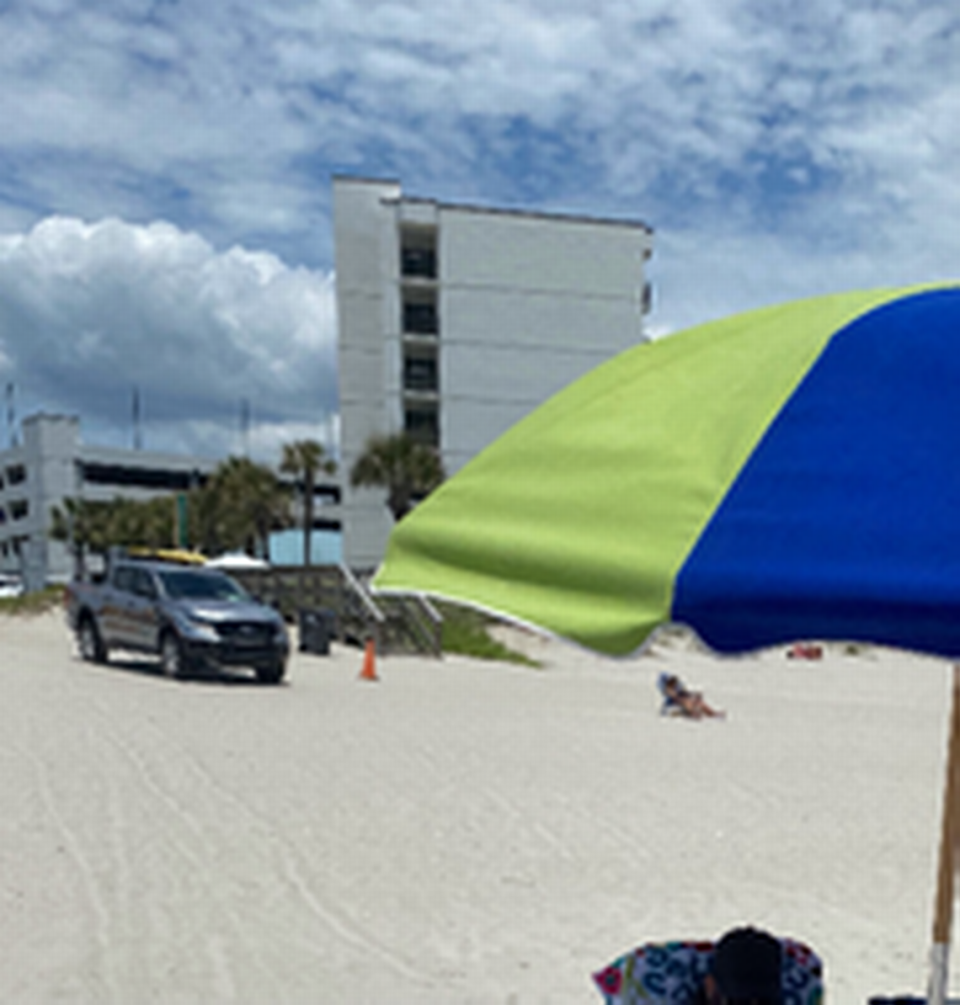Could an umbrella prevented Myrtle Beach area beachgoer from being struck by police truck?
The recent death of a woman who was run over by an Horry County beach patrol officer has people, and officials, talking about beachgoers’ visibility on the beach.
Sandra “Sandy” Schultz-Peters, 66, was sitting on the beach when she was run over by Horry County beach patrol officer Julian “Duke” Brown on June 13, 2024, The Sun News reported. Brown was driving an Horry County pickup truck.
Schultz-Peters died later in the hospital from injuries sustained in the crash. The South Carolina Highway Patrol is investigating.
At the time of the collision, Schultz-Peters was sitting in a chair on the beach without an umbrella and appeared to be in front of the emergency vehicle lane. It has been suggested that if Schultz-Peters had an umbrella, or some other shading device, that it would have increased her visibility.

Due to the height and length of the hood, a full-size truck can have a large blind spot in the front, making it especially hard to see children or people low to the ground. A pickup can have a front blind spot up to 11-feet longer than a sedan does, Consumer Reports found. Horry County beach patrol usually drive Ford F-150 trucks.
Although tents and umbrellas could increase the visibility of beachgoers for trucks, a congestion of umbrellas made it difficult for lifeguards to see, said Rep. William Bailey, R-Little River. It was also difficult for emergency services to make it to the surf when there was a large number of tents.
From Memorial Day to Labor Day tents and umbrellas larger than 7 1/2 feet are banned on the beaches across the Grand Strand. This started in North Myrtle Beach in 2014.
Bailey, who was the North Myrtle Beach Public Safety director for five years, said he believes full-size vehicles should not be used for patrol during peak season. The beaches along the Grand Strand see millions of visitors each year.
Bailey said he’s looking into a ban similar to the ban on bicycles, which are not allowed on the beach between 10 a.m. and 5 p.m. during the summer. Currently, the only vehicles allowed on the beach are police or emergency vehicles.
“If it’s too crowded to have (bicycles), it’s too crowded to have these trucks,” Bailey said.
One reason pickups are used is because they can easily carry life-saving gear, The Sun News reported. An alternative Bailey suggested was to store emergency equipment at lifeguard towers. This would allow first responders to access medical supplies without having to drive a truck on the beach
“I know it can be done a different way,” Bailey said. “But people have to be willing to do that.”
As for staying safe on the beach, Bailey said to stay as far from the beach emergency lane as possible. Beach patrol typically set up an emergency lane for trucks near the dunes marked by cones or flags. It is not explicitly illegal to sit in these areas, as the law says obstructions such as an umbrella is not allowed, but it can be dangerous.
Following the accident, Horry County has begun using more ATV and foot-traffic for patrols and less trucks, according to The Sun News. Myrtle Beach is looking into adding sensory or front cameras to their trucks to help with visibility.
Here are other rules and regulations to follow in Myrtle Beach, North Myrtle Beach, Horry County and Surfside Beach.
What’s not allowed on the beach
Any motorized vehicles
A beach shade or tent from Memorial Day through Labor Day
An umbrella with a diameter greater than 7 feet, 6 inches.
Alcoholic beverages
Any glass, whether it’s a cup or a beverage
Metal shovels
Pets between 10 a.m. and 5 p.m. from May through Labor Day
Bicycles from 10 a.m. to 5 p.m. starting in May and ending Labor Day
No fireworks, grills or any other forms of fire
Laws to follow
Do not put up umbrellas between the umbrella line created by lifeguards and the water.
Don’t swim farther out than 50 yards or chest length into the water.
Do not walk on or damage the sand dunes.
Fill in a hole after digging it.


